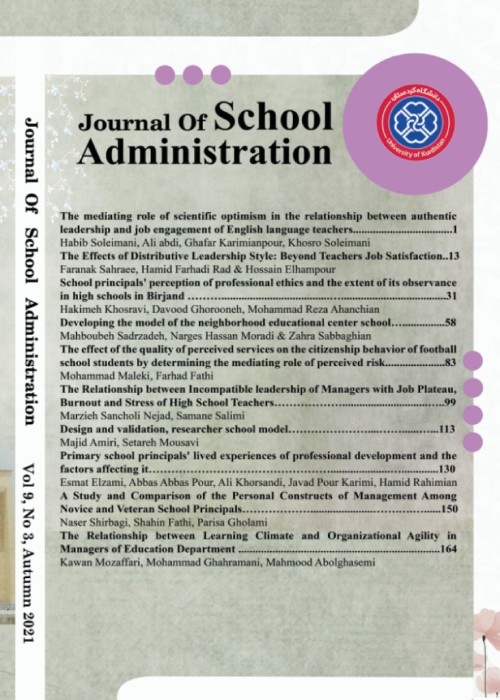Structural Relationship of Knowledge Sharing with Effectiveness of School Educational Groups: Mediating Role of In-group Trust and Intra-group Collaboration
Pundits of education believe that quality and effectiveness in education requires the existence of educational groups in all areas regarding teaching-learning processes. This needs especially acute when education undergoes fundamental changes, because educational groups play an essential role in guiding and enhancing teaching-learning processes and making desirable changes in educational systems. Hence, the performance of educational groups, active in the field of education, is considered as part of quality assurance programs and the effectiveness of education for the purpose of improvement and growth of teachers'' professions. The performance of educational groups in providing educational services to teachers is a way for their professional growth and improvement in order to achieve the basic benefits (vision, value, mission, goals, etc.) of education, i.e. to enhance teachers’ performance quality and consequently the growth and development of the educational system. School educational groups, as a link related to educational factors, teachers and students have a sympathetic and special place in achieving educational goals. Wu & Short (1996) believe that education as one of the most significant social institutions plays a pivotal role in longevity and development of each society through teaching children and future-makers of that society. Among them, teachers as human resources and implementers of education and training programs are its essential elements, and their performance plays a major role in the success of this institution. Therefore, in trying to improve the quality of education, more focus should be placed on teachers and the organizational aspects that affect their work in schools. This is based on an assumption that understanding the factors affecting teacher performance increases our knowledge of how schools improve. The goal of present study is investigate the structural relationship of knowledge sharing with effectiveness of school educational groups by mediating in-group trust and intra-group collaboration of teachers of three educational levels of schools in Babol. Present study is a practical research on the basis of purpose and is a type of descriptive-correlative researches on the basis of data collection method.
The statistical population of this study includes all primary and secondary first and second school teachers (n=3100, m=1426, f=1674) in the school year 2017-18. Given the assumed methods, 9 parameters should be estimated, including 3 parameters in gamma matrix, 2 parameters in beta matrix, 3 parameters in WiFi matrix and 1 parameter in Sai matrix. Accordingly, the sample size should be at least 5 to 50 times more than the desired parameters (Müller, 1996). Based on the number of parameters existing in the model, a sample of 200 people was selected using stratified random sampling. They included 200 primary and secondary first and second school teachers in Babol (m=82, 41%; f=118, 59%). In the study sample, the average effectiveness of school education groups (M = 3.918) in a range of 5 points shows that the sample teachers evaluated the effectiveness of school educational groups above the average level. Also, the average knowledge sharing, intra-group trust and intra-group cooperation were estimated above average. All the teachers of study sample completed the questionnaires of knowledge sharing, in-group trust, intra-group collaboration and effectiveness of school educational groups. In order to test the reliability of these instruments, Cronbach’s alpha was used. The data was analyzed through structural equation model and by SPSS and LISREL software.
The findings showed that there is a positive and significant relationship between knowledge sharing, in-group trust and intra-group collaboration with effectiveness of school educational groups. Knowledge sharing has a direct and significant effect on effectiveness of educational groups. Also, knowledge sharing with mediating the in-group trust has an indirect and significant effect on effectiveness of school educational groups. Knowledge sharing with mediating the intra-group collaboration has an indirect and significant effect on effectiveness of school educational groups. The results of this study indicated the importance of paying attention to the role of knowing sharing, in-group trust and intra-group collaboration of teachers in increasing the effectiveness of school educational groups.
Discussion and conclusion
In general, based on the results obtained, it can be concluded that the sharing of knowledge, trust and cooperation within the group will increase the effectiveness of school educational groups and in turn results in improvement and enhancement of the education system. Knowledge sharing in educational groups along with close cooperation and trust among teachers in return for this knowledge sharing and cooperation in the exchanged information has increased the effectiveness and performance of teachers, which, in turn, leads to the growth and development of their professions and the results will be reflected in improving the empowerment of students. Finally, it is suggested that the educational groups and related meetings be equipped with the appropriate tools and technology to perform the assigned tasks so that teachers are able to participate in the groups in a real and virtual method to share their knowledge and information. In this way, they can pursue the acquisition of information and knowledge through other members of the group. Education officials are encouraged to use brochures, booklets and posters to inform teachers about the impact of collaboration, teamwork and the sharing of knowledge and trusting each other and its positive effects on improving the process of group work and training sessions. Also, by creating a friendly and informal atmosphere in education contributes to more communication among teachers and strengthens their cooperation. Furthermore, using the guidelines of experienced and knowledgeable educational groups, they can overcome the problems arising during the work. It is necessary to create a culture of trust, participation and cooperation and their goals in improving and enhancing nationwide educational centers and schools, and of course, the cooperation of the mass media will be fruitful in this regard. Incorporating internet for sharing knowledge in school educational groups and the free use of virtual chat rooms so that teachers can easily exchange information and knowledge and have shares in each other''s knowledge
- حق عضویت دریافتی صرف حمایت از نشریات عضو و نگهداری، تکمیل و توسعه مگیران میشود.
- پرداخت حق اشتراک و دانلود مقالات اجازه بازنشر آن در سایر رسانههای چاپی و دیجیتال را به کاربر نمیدهد.




